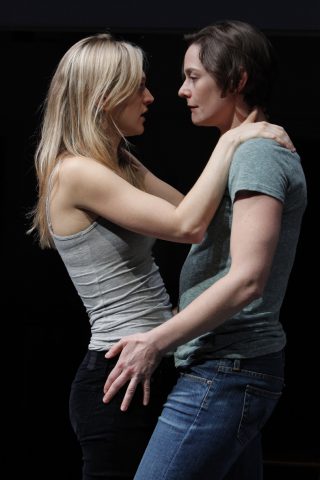“You have a beautiful mouth. I really like watching you talk.”
So says a swooning Amy (Jenny Bacon) to her soon-to-be lover Ellen (Marin Ireland) in award-winning playwright Lisa Kron’s newest theatrical offering, In the Wake. And while protagonist Ellen may have a beautiful mouth, listening to what comes out of it is perhaps the least enjoyable element of an otherwise resplendent work boasting authentic performances and an ambitious script that poignantly merges modern love and political discourse.
In the Wake begins in the modest East Village apartment of Ellen and her live-in boyfriend, Danny (Michael Chernus), on the Thanksgiving Eve following the contested 2000 election of George W. Bush. Here, Kron introduces the audience to the politically obsessive and maddeningly effusive Ellen, as well as the lively and likeable spray of educated urbanites who form Ellen’s “found family.” Chernus’ Danny is a laid-back, down-to-earth guy mostly defined by his unwavering love and affection for Ellen and his clunky attempts at using joviality to diffuse conflict. We also meet Danny’s sister, Kayla (Susan Pourfar), and her wife, Laurie (Danielle Skraastad), a loving, stable couple who often express muted frustration over Ellen’s need to constantly broadcast her opinions and attempt to shape others’; and Judy (Deirdre O’Connell), Ellen’s friend and former colleague whose experience working in impoverished, war-torn nations has left her more than a little world-weary. Each of these characters in some way serves as a foil for Ellen’s breathless, twitchy garrulity (she, too frequently, peppers her rants with overly cute statements indicating how aware she is of her insufferableness) and her failure to see the gray areas in complex issues.
Ellen immediately launches a diatribe of exasperation with the injustice she sees in the election’s recount proceedings, kicking off a trend that continues throughout the play: The tumultuous first term of Bush’s presidency (including 9/11, Katrina and his reelection) as a platform off which Ellen and her friends bounce their biases, ideas and experiences. A highlight of the production comes when Tessa (Miriam F. Glover), Judy’s troubled teenage niece, briefly enters the picture. Glover instantly usurps command of the stage with an infectious brand of assertive innocence, and her tenderfooted political pronouncements—and the characters’ awkward reactions to them—encapsulate In the Wake’s themes of fear and uncertainty in a turbulent American era.
Kron unearths Ellen’s less-obvious flaws—her “blind spot,” as Ellen calls it—when Ellen runs into passionate artist Amy (Jenny Bacon) while speaking together on a panel. In a scene that builds palpable emotional and sexual tension between the women, Amy reveals that after previously reading a newspaper article about Ellen, she thought, “This is the person I’m going to marry.” I wondered, here, how much Amy shelled out to park the U-Haul she drove to the conference, but Ellen—a neophyte concerning those “so intense it’s silly” Sapphic entanglements many of us (OK, I) know so well—far from shares my sentiments, and she embarks on an ardent affair with her starry-eyed suitor.
Ireland’s inspired but (necessarily) abrasive portrayal of Ellen makes it believable that Ellen would fall for a woman whose head seems to float serenely in clouds at Mt. Kilimanjaro-like heights—someone so very unlike salt-of-the-earth Danny. Kron’s script never treats the relationship between Ellen and Amy as anything less than a soul-shaking experience for both women, which renders Ellen’s decision to disclose her affair to Danny while continuing her pursuit of Amy convincing. The dynamics skillfully woven by all the play’s actors make Ellen’s wrenching inability to choose between comfort and passion compelling and relatable. And it would be too easy to dismiss Ellen for what some might see as selfish moral ambiguity that ultimately wreaks havoc on lives of the people she loves: Our well-meaning heroine, not surprisingly, emerges the most damaged by her emotional vacillation and addiction to living in flux.
Notably, my companion at the performance—whose Tea Party politics lead her to literally foam at the mouth if she hears the word “liberal” in so much as the context of shampoo application—found In the Wake as absorbing as I did. She noted (and I concurred) that, “I never at any point felt like I wanted it to be over”—no small accomplishment for a two hour and 45 minute play completely driven by dialogue and lofty, lefty sociopolitical themes.
Sometimes rambling, but always riveting, In the Wake ultimately soars as a cautionary tale on the trappings of trying times—and taking ourselves too seriously in them.
At the Public Theater, 425 Lafayette St @ Astor Pl, (212) 967-7555; publictheater.org. Through Nov. 21. Running time: 2 hours 45 minutes.




What Do You Think?